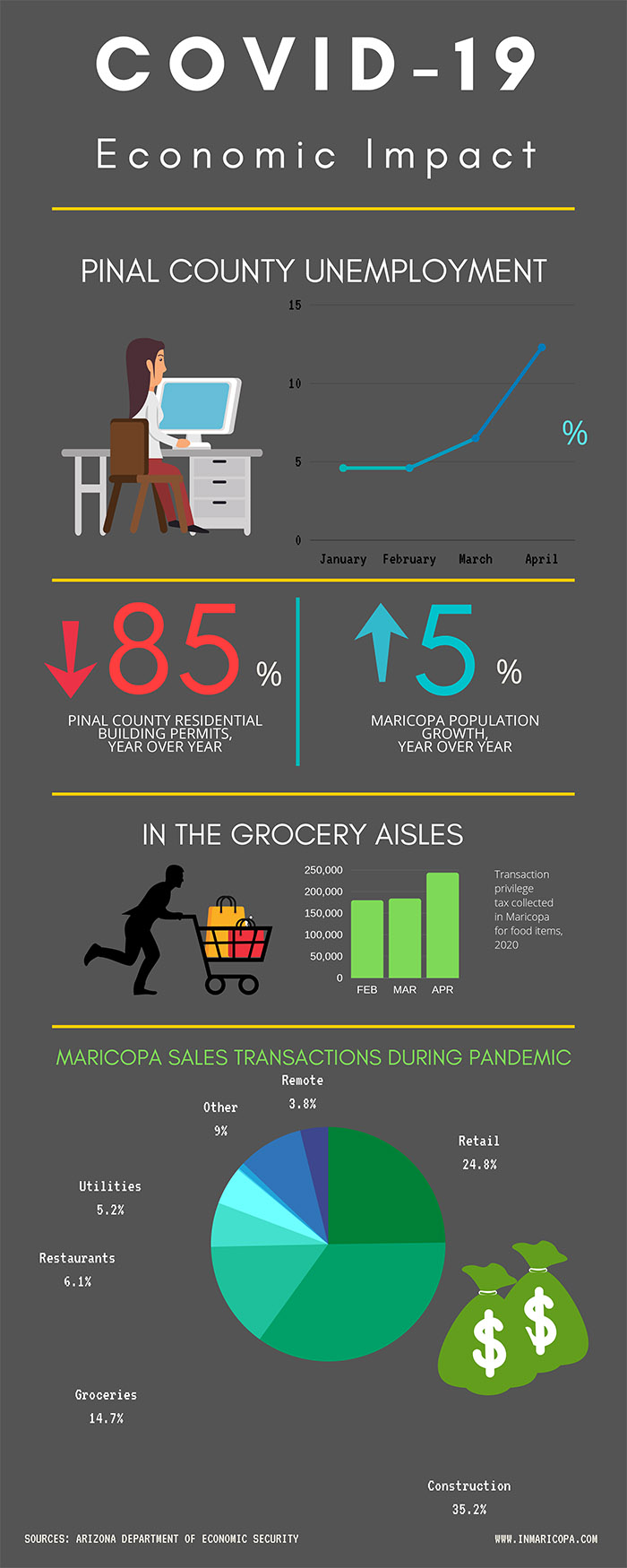
[pull_quote_right]“I think that’s awesome, I think it’s wonderful. I think it’s long overdue.”[/pull_quote_right]With the county and the state posting record-high unemployment but local consumerism showing signs of recovery, the complex impact of COVID-19 on the future economy is just beginning to get sorted.
Business leaders are looking beyond the coronavirus for a silver lining to come out of the discombobulation.
“I think that industrial growth, commercial growth and even residential growth is going to be strong for Pinal County coming out of this, and we need to be ready for it,” Global Water Resources CEO Ron Fleming told a virtual panel for Pinal Partnership.
Fleming said Arizona and Pinal County may be the beneficiaries as businesses and countries re-examine supply chains and locations.
“They line up really well for what Arizona and Pinal County can offer,” he said. “What we’re doing as a company, just building on what we’ve obviously been doing the last 15-20 years in Pinal County, is being ready for that.”
For the moment, Pinal County’s unemployment rate is 12.3%, a year-over-year increase of 150%.
At the same time, the county’s single-family home building permits, which had been up in March 92% compared to a year earlier, tumbled in April, 85% down year over year.
Not all businesses felt a dramatic downturn, especially those businesses considered essential. Jim Garrett, owner of Garrett Motors in Coolidge, told the panel business was “down a little bit” in March and April but overall has remained good.
That was true of essential and some nonessential businesses in Maricopa, where the collection of sales tax in March and April showed busy shoppers. Restaurants, which were not allowed to have dine-in options, took a hit in March but showed dramatic recovery in April. Retail and contracting held steady in March and rose to robust numbers in April.

Remote sales, such as from Amazon, did not show a dramatic rise, while local grocery sales reached their second-highest peak in the last two years.
Overall, compared to last April, the Maricopa marketplace took in 25% more in sales tax even as residents were going on unemployment for the first time.
Staying linked in with potential customers facing an uncertain economic future required some entrepreneurship on the part of Pinal businesses.
Garrett said his company took advantage of the opportunity to become even more engaged online. They also offered “touch-free” service, picking up and dropping off vehicles, and “you would never see us.”
Jackie Elliott, president of Central Arizona College, also said it was a moment of innovation and opportunity. As was the case with several secondary schools, the community college was just going into spring break when shutdowns were announced. The administration quickly put together a plan to teach its courses on a virtual platform for the rest of the semester.
“We chose very conscientiously to use the word ‘virtual’ instead of ‘online,’ because when you talk about learning and students and how students learn, ‘online’ is asynchronous,” she said. “And we wanted things that were synchronous, that flowed and allowed students to interact.”
The college put in place a crisis communication plan and tried to stay aware of stress levels with the staff, which included faculty teaching their courses virtually while also teaching their own children at home. CAC also allowed employees to cash out up to 40 hours of vacation time.
Going forward, Elliott said, CAC expects every course and program that is available face to face also will be available in a virtual form.
“I think that’s awesome,” she said. “I think it’s wonderful. I think it’s long overdue.”
Elliott said she had been reading about Winston Churchill during the pandemic and found some spot-on leadership guidance: “Be present all the time.”
Garrett said he and his family also lived by that philosophy, being on site as much for the other employees as for the customers.
Fleming said the best way to build morale was to be present in the community. Besides expanding its low-income relief tariff and stopping all disconnects and late fees, Global Water donated to local food banks. He said having employees involved in carrying out those programs also boosted morale.
When the company reached 1,000 days without an OSHA-related incident, they celebrated by sending all employees gift baskets and gift cards. Also an essential business, Global took early steps to mitigate the chances of spreading COVID-19.
Global Water eliminated group meetings and closed its walk-in customer service desks. Those who could work from home did so. Operations personnel used their company vehicles as their mobile offices.
It all may have changed the future of the call center. Under normal circumstances, it is composed of cubicles close together. For the duration, Global supplied those employees with laptops and moved them home.
“And our call center metrics have improved,” Fleming said.

![Maricopa restauranteur makes Food Network connection [Namkeen Dhaba]](https://www.inmaricopa.com/wp-content/uploads/2024/04/439456716_377105198650519_7536248579664805896_n-218x150.jpg)









![Maricopa’s ‘TikTok Rizz Party,’ explained One of several flyers for a "TikTok rizz party" is taped to a door in the Maricopa Business Center along Honeycutt Road on April 23, 2024. [Monica D. Spencer]](https://www.inmaricopa.com/wp-content/uploads/2024/04/spencer-042324-tiktok-rizz-party-flyer-web-218x150.jpg)
![Alleged car thief released without charges Phoenix police stop a stolen vehicle on April 20, 2024. [Facebook]](https://www.inmaricopa.com/wp-content/uploads/2024/04/IMG_5040-218x150.jpg)
![Maricopa restauranteur makes Food Network connection [Namkeen Dhaba]](https://www.inmaricopa.com/wp-content/uploads/2024/04/439456716_377105198650519_7536248579664805896_n-100x70.jpg)


